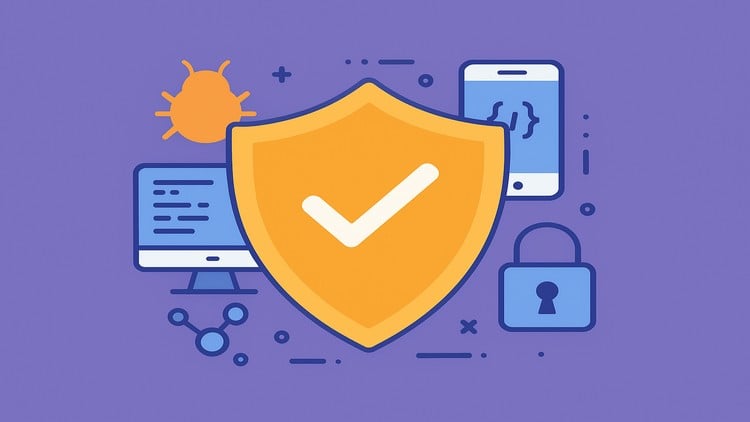
From Zero to Exploit: Practical Security Testing of Web, API, Android & Source Code
⏱️ Length: 22.6 total hours
⭐ 4.61/5 rating
👥 3,587 students
🔄 July 2025 update
Add-On Information:
Note➛ Make sure your 𝐔𝐝𝐞𝐦𝐲 cart has only this course you're going to enroll it now, Remove all other courses from the 𝐔𝐝𝐞𝐦𝐲 cart before Enrolling!
- Course Overview
- Embark on a comprehensive journey from foundational security principles to advanced exploitation techniques, mastering the art of identifying and mitigating vulnerabilities across diverse application landscapes.
- This practical, hands-on course equips you with the essential skills to proactively secure web applications, robust APIs, native Android applications, and analyze source code for hidden weaknesses.
- Dive deep into the OWASP Top 10, translating theoretical knowledge into actionable security testing methodologies through real-world simulations and cutting-edge tools.
- Develop a critical mindset for identifying attack vectors and formulating effective defense strategies in an ever-evolving threat environment.
- Gain a holistic understanding of application security by exploring the interconnectedness of web, API, and mobile security, and how source code analysis plays a pivotal role in uncovering deep-seated flaws.
- The curriculum is meticulously designed to foster a practical, “learn-by-doing” approach, ensuring participants can immediately apply learned concepts in professional security testing scenarios.
- By the end of this course, you will be proficient in identifying common misconfigurations, logic flaws, and injection vulnerabilities that plague modern applications.
- Understand the attack surfaces presented by different application components and learn to craft tailored testing methodologies for each.
- The course emphasizes the importance of reporting and documentation, enabling you to clearly communicate your findings and recommendations to stakeholders.
- Prepare to challenge your understanding of security by actively engaging with simulated environments and learning to think like an attacker.
- Requirements / Prerequisites
- Basic understanding of networking concepts and how the internet functions.
- Familiarity with fundamental programming concepts, though not necessarily deep coding expertise in any specific language.
- A willingness to experiment, troubleshoot, and engage in problem-solving within a hands-on learning environment.
- Possession of a computer capable of running virtual machines and necessary security tools.
- An analytical mindset and a desire to understand the “why” behind security vulnerabilities.
- No prior formal security training is strictly required, but a foundational grasp of IT concepts will be beneficial.
- Comfort with command-line interfaces will enhance the learning experience, especially for certain tools.
- An open mind to explore both defensive and offensive security perspectives.
- Skills Covered / Tools Used
- Web Application Security Testing: Exploitation of XSS, SQL Injection, CSRF, and other web vulnerabilities.
- API Security Testing: In-depth analysis of RESTful and SOAP APIs, including authentication, authorization, and data validation bypasses.
- Android Application Security: Static and dynamic analysis of Android apps, identification of insecure data storage, code tampering, and permission misuse.
- Source Code Analysis: Static analysis techniques to identify vulnerabilities directly within application source code.
- Network Reconnaissance: Utilizing tools like Nmap for network mapping and vulnerability scanning.
- Proxy Tools: Mastering tools like Burp Suite and OWASP ZAP for intercepting, analyzing, and manipulating HTTP/S traffic.
- Mobile Security Frameworks: Exploring tools for Android app analysis and penetration testing.
- Vulnerability Enumeration: Developing a systematic approach to identifying potential weaknesses across different application layers.
- Exploitation Techniques: Learning to leverage identified vulnerabilities to gain unauthorized access or control.
- Reporting and Documentation: Articulating security findings clearly and concisely.
- Understanding of Application Architecture: Analyzing how different components interact and where security gaps can emerge.
- Basic Cryptography Concepts: Understanding common cryptographic weaknesses and their impact.
- Benefits / Outcomes
- Become a more security-conscious developer, engineer, or analyst, capable of building and testing more secure applications.
- Gain the confidence to perform independent security assessments of web, API, and Android applications.
- Enhance your resume and career prospects in the rapidly growing field of cybersecurity and application security.
- Develop the ability to proactively identify and mitigate security risks before they are exploited in production environments.
- Contribute to building a more secure digital landscape by understanding and addressing common vulnerabilities.
- Acquire practical skills that are highly sought after by employers in various industries.
- Be equipped to participate effectively in security audits and compliance efforts.
- Develop a deeper understanding of the OWASP Top 10 and how to defend against these prevalent threats.
- Foster a proactive security culture within your teams and organizations.
- Gain valuable experience in using industry-standard security testing tools.
- PROS
- Extremely Practical and Hands-On: Focuses on real-world application of security testing principles with extensive lab exercises.
- Comprehensive Scope: Covers a broad range of essential security testing areas (Web, API, Android, Source Code).
- OWASP Focused: Directly addresses the industry-standard OWASP Top 10 vulnerabilities.
- Up-to-Date Content: Regularly updated to reflect current threats and techniques (July 2025 update).
- High Student Satisfaction: Demonstrates effectiveness with a 4.61/5 rating and a large student base.
- CONS
- Requires Dedicated Learning Time: With 22.6 total hours, participants need to commit significant focused study time.
Learning Tracks: English,IT & Software,Other IT & Software
Found It Free? Share It Fast!